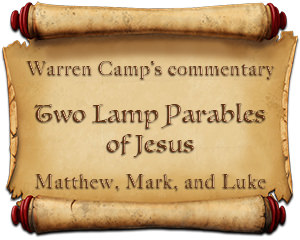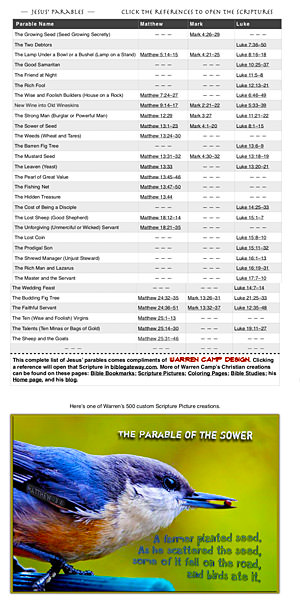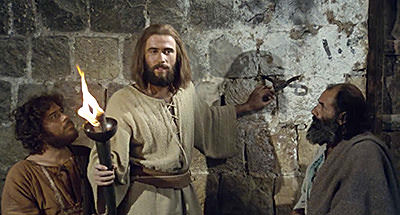
Jesus tells us in four versions of two “lamp” parables that you don’t light a lamp and then hide its light. That would be foolish. Rather, you place that light (your inner Light) where it can be seen and provide light to everyone.

† Find Warren’s short summary at the bottom of page.

Click the list or the “bird” to enlarge and use Warren’s list of forty-four of Jesus’ parables (a PDF file with links to Scriptures).

Watch this popular JESUS film clip about the Lamp Parables.
Start Reading Warren’s Commentary . . .
Find his summary at the bottom.
par•a•ble [noun] a simple story used to illustrate the meaning of or a moral or spiritual lesson, as told by Jesus in the gospels
synonyms: allegory, moral story/tale, fable
Two Lamp Parables of Jesus
Matthew 5:14–16; Mark 4:21–25; Luke 8:16–18; 11:33–36
The four versions of the Parables of the Lamp are found in the gospels of Matthew, Mark, and Luke. There are three versions of A Lamp on a Stand and one version of The Lamp of the Body. I’ll cover all four “lamp” parable versions in my commentary.
By placing these parables of the lamp immediately after the Parable of the Sower, Seed, and Soils, both Mark and Luke are emphasizing the resulted gain from hearing the Word of God fruitfully. The two parables relay the same message and speak the same topic, namely: the Word of God and its effect upon the heart of the believer. When a disciple such as you and I reads and understands the Word of God sufficiently so that we’ll bear fruit — sixty, eighty, even a hundredfold — we become beneficial light for others.
The Parable of the Sower, Seed, and Soils shows “how fruit is borne in the believer’s life.” The analogy in the Parable of the Lamp on a Stand is changed to “how light is thrown on a believer’s life.” Thus, both parables illustrate the growth and manifestation of the life of Christ in believers. The theme of how God’s Word is received into the hearts of men (their “soils”) is continued in Luke 8:18. There, the illustration of the lamp that must be put on a stand emphasizes two points when the disciples are told, “So take care how you listen,” and “My mother and my brothers are those who hear the Word of God and do it” (a concluding word purposely placed at 8:21). However, today I’ll show you how the Parable of the Lamp adds significant concepts that aren’t so clearly seen in the parable of the soils. All of this provides us with much instruction for true Christian living.
Jesus tells us in both of Luke’s parables that you don’t light a lamp and then conceal its light; that would be foolish. Rather, you appropriately place that light (albeit your inner Light) where it can be seen and provide needed light to everyone.
Compliments of Jesus Film Project
Two Parables about Lamps
A Lamp on a Stand . . . and . . . The Lamp of the Body
Matthew 5:14–16; Mark 4:21–25; Luke 8:16–18
Lamp Parable #1 — A Lamp on a Stand
To better appreciate the context in which the gospel writers placed their versions of Jesus’ two "lamp" parables, please first read the text of each passage.
14“You are the light of the world. A town built on a hill cannot be hidden. 15Neither do people light a lamp and put it under a bowl. Instead they put it on its stand, and it gives light to everyone in the house. 16In the same way, let your light shine before others, that they may see your good deeds and glorify your Father in heaven” (Matthew 5:14–16).
A Lamp on a Stand
21He said to them, “Do you bring in a lamp to put it under a bowl or a bed? Instead, don’t you put it on its stand? 22For whatever is hidden is meant to be disclosed, and whatever is concealed is meant to be brought out into the open. 23If anyone has ears to hear, let them hear.”
24“Consider carefully what you hear,” he continued. “With the measure you use, it will be measured to you—and even more. 25Whoever has will be given more; whoever does not have, even what they have will be taken from them” (Mark 4:21–25).
16“No one lights a lamp and hides it in a jar or puts it under a bed. Instead, he puts it on a stand, so that those who come in can see the light. 17For there is nothing hidden that will not be disclosed, and nothing concealed that will not be known or brought out into the open. 18Therefore consider carefully how you listen. Whoever has will be given more; whoever does not have, even what he thinks he has will be taken from him” (Luke 8:16–18).
I imagine that Jesus was smiling when he spoke his words in Luke’s v. 16. After all, if you’re going to light a lamp, you do it to illuminate an area, not to hide or conceal something in it. If hiding or concealing something was your purpose or desire, you’d have no reason light a lamp!
In the context found in Matthew’s version, Jesus said, “In the same way, let your light shine before others, that they may see your good deeds and glorify your Father in heaven” (Matthew 5:16). Jesus’ main point is that we’re to allow the goodness within each one of us to produce good works, so that our God continues to be glorified.
Looking carefully at Mark and Luke’s accounts, Jesus was clearly making the point that anything hidden or secret will be exposed. While God already knows our inner thoughts, one day everything hidden from the world will be made known when we’re judged by Jesus himself for what we’ve done and said. The lamp herein represents the believer’s new life in Christ, which is to shine outwardly, demonstrating the character and works of Christ inside us.
In Mark 4:21, the Lord tells us that the lamp is intended to shine. To cover it with a “basket” or place it under a “bed” would prevent its illumination or revelation. Here we see a reference to things that can hinder the function and normal development of Christ’s life in believers’ lives. The “basket” refers to the common household vessel that was used to hold and carry flour and other dry items. Essentially, a basket was used to contain and measure the necessities of life.
The “bed” in that same verse illustrates another hindrance to a disciple’s ability to shine Christ’s life outwardly. The bed signifies ease, comfort, and self-indulgence. It reflects back to “the deceitfulness of riches,” “the pleasures of this life,” and the “desire for other things,” all of which are “thorns” that choke the development of seed, making it unfruitful (Mark 4:7, 19; Luke 8:14). What a warning Jesus gives us! He urges us to stop seeking pleasures and riches that distract us from finding him and abiding in his will for us. If we fail to prioritize and follow Christ, our light will be hidden, our spiritual fruit will never mature, we’ll miss our purpose here, and we’ll lose out on receiving blessings in the next age.
When Jesus tells us that a functional lamp is normally placed on a lampstand in order to provide light to people, he’s also indicating that it’s an abnormal condition when a lamp’s light is hidden by the basket or the bed. This contrast between normal and abnormal spiritual conditions parallels the normal condition of the good soil and the abnormal condition of the other soils in the companion parable. This thought of hiding the light — an abnormal condition — leads us to the next passage: Mark 4:22–23.
If you’ll reread both verses now you’ll see that the phrase “whatever is concealed” in Greek literally means “become covered” and refers to the act of hiding. Here the Lord is actually warning us that if we hide the light that’s in our lives, such an act of concealment, although done secretly in our hearts, will eventually be revealed during our future judgment at the Judgment Seat of Christ. The words of our Savior — “If anyone has ears to hear, let him hear” — constitute a definite warning! If you’re willing to hear, you should hear and take appropriate action! This thought is continued and amplified in the next statement of Jesus (Mark 4:24): “Consider carefully what you hear,” he continued. “With the measure you use, it will be measured to you — and even more.”
Herein, the Lord is giving his hearers and us an important principle concerning our “hearing” of the God’s Word. We should pay close attention to the Word of God that we hear, giving it genuine consideration and letting it have its way in our lives. If and when we pay close attention to his Word, we’ll receive “light” (the revelation we receive from his Word) and “spiritual life.” It’s wise to add here that, although God’s Word to us comes primarily through Scripture, it may also come to us through sermons, through testimony of fellow believers, and/or through God’s “speaking” to us in our conscience or through the Spirit of Jesus.
So, how do we interpret this first “lamp” parable that three gospel writers present? The verse in Luke’s version about “nothing being hidden” is followed by this familiar saying: “Therefore consider carefully how you listen” (Luke 8:18), which is very similar to 8:8 in the previous Parable of the Sower, Seed, and Soils, which says, “He who has ears to hear, let him hear.” Clearly, the theme of this Lamp on a Stand Parable focuses on hearing the Word of God about his kingdom, fully comprehending its implications, and acting on them, thereby producing a “good crop of varying yields.” Verse 18 refers to revelation and knowledge: Those who listen and therefore have understanding will be given more knowledge; those who don’t have understanding, because they don't listen well or don't make an effort to do so, even what they seem to have (in terms of understanding) will be taken away. How sad that is.
When you review the other “wise vs. foolish” parables of Jesus (the Wise and Foolish Virgins and the Wise and Foolish Builders), you’ll see that they illustrate the fact that those who are already wise and smart are those who listen and learn, whereas foolish people are the ones who cannot listen and learn or won’t try. Jesus’ point herein is that all things hidden and secret can and will be made known openly if we sincerely choose to listen and learn.
The lamp on the stand — which is also a message about the kingdom of God — mustn’t be visibly hidden or audibly whispered in secret. Rather, it must be shown and proclaimed openly and clearly “so that those who come in will see the light” who provides illumination and power. Jesus is that Light; it is he who was instructing his disciples then and all of us today. Please don’t stifle the message of the kingdom. Proclaim it openly!
Have you been tempted to only whisper the message of Jesus’ kingdom to those who’ve never heard it? Do you wind up holding back on your testimony, thereby hiding the Light of his message? In Luke 8:16, Jesus speaks to you and me; he tells us, his disciples, what we’re to do. In 8:18, he implores us to listen carefully to his Word and be prepared to reap the benefits of following it. Otherwise, the consequence will be tragic.
Why does Jesus urge us to listen carefully? It’s because we need to be shown how great the danger of self-deception can be. The Sower, Seed, and Soil Parable reveals that the seed that fell and bounced off hard-packed-path soil was a reference to the closed-minded attitude of the Pharisees who thought they knew better than anyone else. Consider, too, the two opposing elements in the Wise and Foolish Builders Parable: (1) those who heard Jesus’ words and put them into practice and (2) those who heard the same words but made no effort to apply them. For the same reason, Jesus again warned his readers [and listeners]: “Consider carefully how you listen” (v. 18). Then be ready to act by showing others the Light of Jesus that shines inside you.
Sadly, the world prefers darkness. But a true Christian would never choose to “hide his lamp.” Today, it’s time for each of us to disclose and proclaim the wisdom of God that’s been revealed in Jesus Christ. Are you a disciple? Sure you are! Are you a source of his light? That’s every disciples’ glory, as well as our vital mission. In you, God’s “lamp” has been lit. It must not be hidden. Instead, as we learn in Revelation 1, he and his Light must be set high on a lampstand so we can present him and his Word for all to see.
Finally, note that the Parable of the Lamp on a Stand in Luke is followed by an encounter of the Lord with his human family. You’ll see it played out when you watch the short video above. Obviously, Luke carefully placed this encounter into the text in order to highlight and complete this parable’s lesson. Notice the words of Jesus here. . .
Jesus’ Mother and Brothers
19Now Jesus’ mother and brothers came to see him, but they were not able to get near him because of the crowd. 20Someone told him, “Your mother and brothers are standing outside, wanting to see you.”
21He replied, “My mother and brothers are those who hear God’s Word and put it into practice” (Luke 8:16–18).
The potent truths presented to us by this first “lamp” parable should help us become genuine hearers and doers of God’s Word. When we mistakenly tread upon the path of spiritual decrease, we need to quickly and wholeheartedly return to the Lord in humility by confessing our failures. God is merciful. He’ll restore us, so long as we’re serious, honest, and devoted to returning to the straight, well-lit path of spiritual increase. May we hear God’s Word to us right now in the Parable of the Lamp on a Stand.
Lamp Parable #2 — The Lamp of the Body
33“No one lights a lamp and puts it in a place where it will be hidden, or under a bowl. Instead he puts it on its stand, so that those who come in may see the light. 34Your eye is the lamp of your body. When your eyes are good, your whole body also is full of light. But when they are bad, your body also is full of darkness. 35See to it, then, that the light within you is not darkness. 36Therefore, if your whole body is full of light, and no part of it dark, it will be completely lighted, as when the light of a lamp shines on you” (Luke 11:33–36).
In this second “lamp” parable — the Lamp of the Body — Luke repeats Jesus’ first “lamp” parable (8:16–18, shown above) but puts it in a different context. Jesus says in v. 33 that the purpose of a lamp, once again, is to illuminate. For that reason, a lamp’s light is put in a prominent place. I understand him to be saying that Jesus has come as the Light of the world, to illuminate people.
In this situation, Jesus refers to the lamp under a basket in an effort to explain that it matters what our eyes view. What we allow our eyes to see affects the goodness (or evil) that develops within us.
The next three verses tell us that the problem wasn’t with verifying the miraculous wonderment that Jesus produced, but with the eyes that beheld it. The eye, Jesus said, is the gateway to a person’s entire being, his whole body. If the eye is good, it lets in light so the whole body becomes illuminated. If the eye is defective, little or no light is let in, making the entire body dark. As such, it seems to me that a man’s ability to understand what God is saying and doing depends on his ability to “see” the truth. The Bible is filled with evidence that shows truth, but the eyes of most men aren’t able or willing to see it.
A Hearty Way to Apply the Lamp Parables Today
I’ll highlight for you what I think is the emphasis behind the text in all four verses of Luke’s Parable of the Lamp of the Body.
Verse 33 speaks of the purpose of the lamp: to provide light. It’s worthless to take the time and energy to light a lamp and then put it somewhere ineffectual. The lamp is to be placed in a prominent location so that everyone can see during times when the environment is dark. For believers and followers of Christ, the living Spirit is inside us, shining his light in all of our spiritually dark environments.
Verse 34 tells us that it’s our eye that perceives light, albeit Jesus who is that Light. The good eye lets the Light in, but the bad eye keeps Jesus and his Light out, leaving us in darkness.
Verse 35 urges us to take care that the Light enters our lives and remains within us. There are times when we allow dark things to enter and fester inside us. Sadly, we can easily become distracted by worldly pleasures that inevitably eat away at our heart for long periods of time. We must be vigilant about what we allow into our lives.
Verse 36 assures us that when we let Christ in, he and his Light shine outwardly through us. Our purpose really, in what he calls us to do as his disciples, is to be a lamp that emits the Light of Christ that shines brightly and lastingly. For his Light to show through us, we must let him come inside us while preventing the darkness from having any access into our lives.
Question 1 How many flashlights do you own? How many work today?
Question 2 Are you closer to your church family or your family of origin? Why?
Question 3 How brightly does Christ’s Light shine in and through you?
“Instead they put [a lamp] on its stand, and it gives light to everyone in the house” (Matt. 5:15a).

Take our “Parables Quiz.”
See Warren’s other “Parables of Jesus” commentaries.
— Warren’s Concise Summary —
The Parable of the Two Lamps, as often retold in Christian teaching, contrasts a small, dim lamp with a larger, brighter one to illustrate the difference between limited human understanding and the fuller light that comes from Christ or greater spiritual truth. In the story, the owner of the brighter lamp doesn’t ridicule the weaker one but simply sets his stronger light beside it, making its inferiority obvious without harsh criticism.
The lesson emphasizes that rather than attacking others’ lesser light, believers should quietly let a truer or more mature witness shine, trusting that genuine light will naturally reveal what’s partial, encourage growth, and draw people toward deeper faith.
